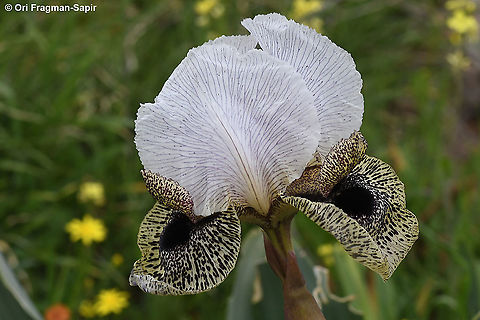
Appearance
''Iris bismarkiana'' is similar in growth to ''Iris susiana'' and ''Iris lortetii'', , they only differ in the colour of the flowers.It is a geophyte, It has short, stoloniferous rhizomes, which are narrow, around 1.5 cm in diameter. It forms long thin stolons, that can reach up to a few meters, into the ground, seeking minerals. The rhizomes and stolons are very prone to viral diseases.
The creeping, habit forms small clumps of plants.
It has 6–8 leaves, which are ensiform , glaucous, and bright green. They can grow up to between 30–50 cm long, and between 2–2.5 cm wide. They form erect fans of leaves, which are similar in form to ''I. susiana'' leaves.
It has a long, slender stem, or peduncle, that can grow up to between 30–50 cm tall. Although, some stems can reach 80 cm tall. The stem is usually taller than the leaves.
The stem has a green, lanceolate, spathes , which is 7.6 cm long.
The stems holds 1 terminal flower, blooming in spring, between March and April. In the UK, it flowered in May.
The flowers are 10–15 cm in diameter, and they have a pale yellow, yellow-green, cream, creamy-white, or white ground. Which is covered with reddish-brown, maroon brown, purple-brown, purple, blue-purple, light violet, lilac, or blue veins or spots.
Like other irises, it has 2 pairs of petals, 3 large sepals , known as the 'falls' and 3 inner, smaller petals , known as the 'standards'. It has ovate shaped falls, which are 6–7 cm long and 4 cm wide. They are densely spotted or veined and have a purple-brown, or dark purple signal patch. The signal is at the entrance to the perianth. It is similar coloured to the spotting or veining. In the middle of the falls, a row of short hairs called the 'beard', which is dark purple, or blackish. The standards are much paler than the falls, and are orbicular , which are 7–9 cm long. They have paler veining or spotting as well, in blue purple, purple or blue. The flowers are very similar in form to ''I. susiana''.
It has oblong shaped stigmas, which are a similar colour to the petals, and are also densely veined. It relies on a small number of pollinator species whose pollinators are specialists.
After the iris has flowered, it produces a seed capsule, that opens up into three sections, to hold multiple seeds.
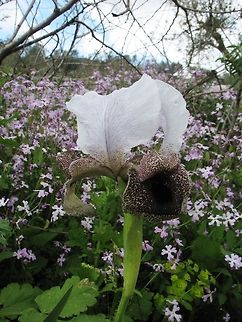
Status
It is a very rare iris, and was under risk of extinction, from threats of urbanization, animal grazing and forestry with in Israel. In Lebanon, it was threatened by housing and road construction on its habitats. It was listed by the International Union for Conservation of Nature , as Endangered when last assessed on 2 May 2016.Within Israel, the species is protected by law, and it is grown in several nature reserves, including the Giv'at Ha-More Nature Reserve and in some of the smaller Reserves on Naphtali hill. Although, it is still declining in populations in the reserves.
In Upper Nazareth, Israel, a residential neighbourhood was planned, but it clashed with hundreds of irises. So a section of land was turned into a nature reserve to protect them.
It is further threatened with the reserves, by an invasive weed, ''Sarcopoterium spinosum'' , a common dwarf shrub which competes with the iris for space. Although, it was found if the weed was burned in patches the iris grew stronger. It is also threatened by caterpillars .
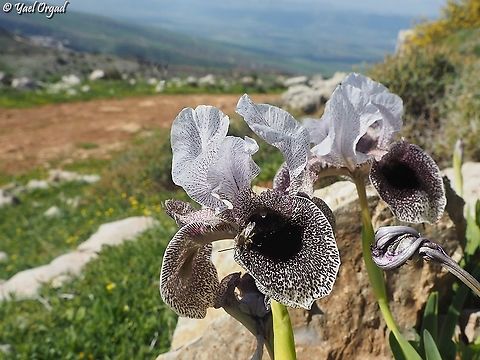
Habitat
It is native to south Lebanon and northern Israel.It grows on the rocky and stony mountain-sides, at the edges of woodlands, or in scrub land. It can be found on heavy, limestone clays, basalt , or terra rossa and soft chalky rocks.They can be found at an altitude of up to 1,300 m above sea level.
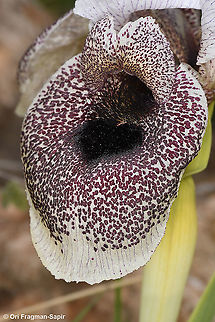
Defense
Like many other irises, most parts of the plant are poisonous , if mistakenly ingested can cause stomach pains and vomiting. Also handling the plant may cause a skin irritation or an allergic reaction.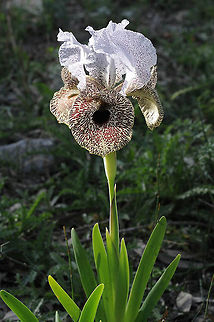
Uses
It is normally used as a garden ornamental plant, but they have also been planted in cemeteries, including in Rajib.The iris rhizome has been used in a perfume called 'Iris Nazarena', by ''Aedes de Venustas'', a New York-based fragrance boutique.

Cultural
One source states that the iris was chosen, as the logo of The Society for the Protection of Nature in Israel, but it is in fact ''Iris haynei'' .The 'Nazareth Iris' is known as the symbol of the city of Nof HaGalil.
References:
Some text fragments are auto parsed from Wikipedia.
